Annotated Bibliography: Ethical Considerations in Counseling
VerifiedAdded on 2022/08/19
|16
|4164
|19
Annotated Bibliography
AI Summary
This annotated bibliography explores ethical issues in family and relationship therapy, a crucial area within psychology. It examines various aspects, including multicultural counseling competence, cultural auditing, and ethical guidelines for therapists. The bibliography analyzes several articles, such as Barden & Greene's study on multicultural counseling competence, Case et al.'s work on ethical considerations in end-of-life care, and Collins et al.'s research on enhancing reflective practice through cultural auditing. It also includes articles on integrating pastoral counseling with psychological practice, examining the relationships between multicultural counseling competence, self-efficacy, and ethnic identity, and exploring culturally competent collaboration with African American families. The studies highlight concerns such as competency factors, informed consent, and confidentiality, providing valuable insights into the challenges and best practices in the field. The bibliography underscores the importance of cultural competence, reflective practice, and ethical considerations in providing effective and culturally sensitive therapy.
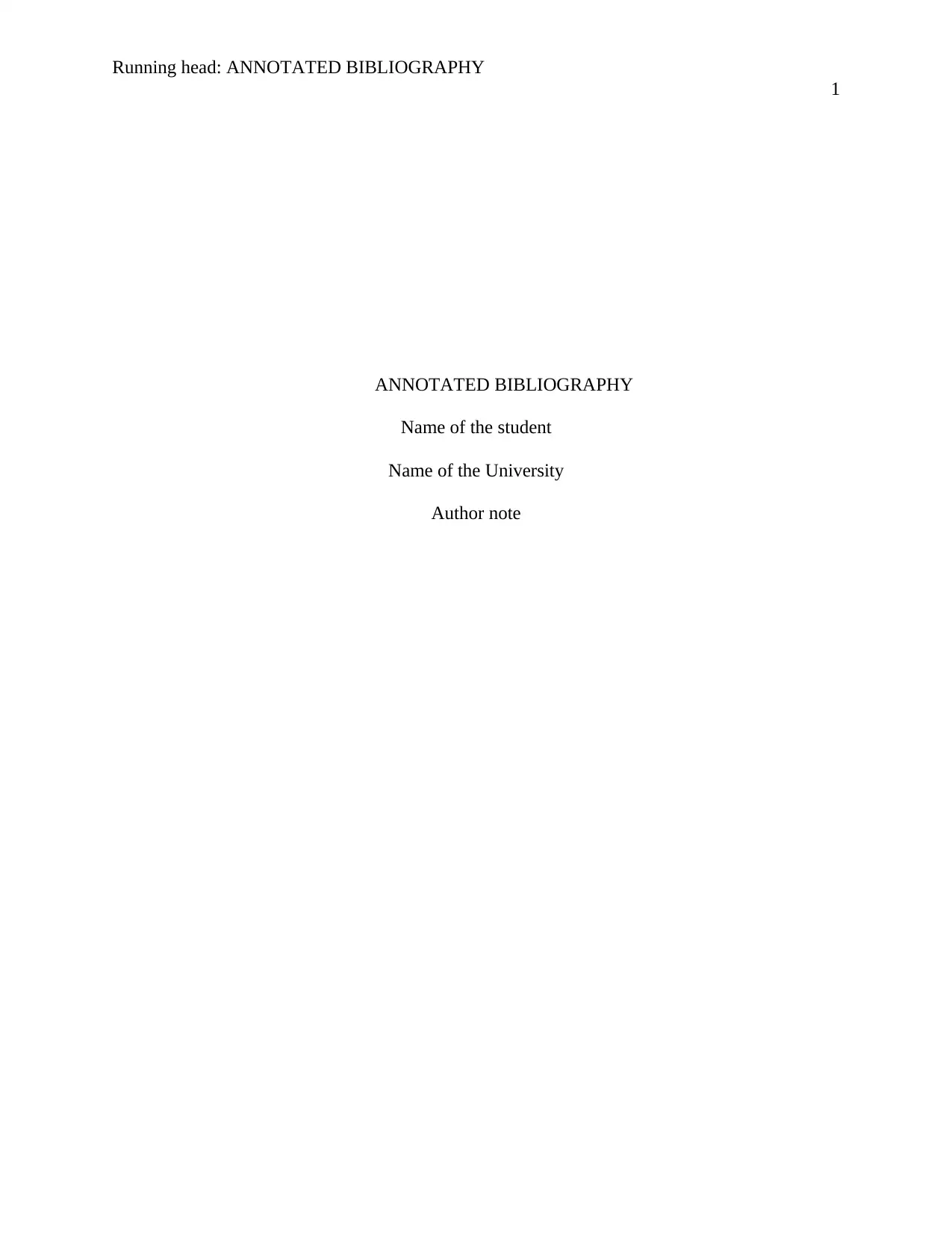
Running head: ANNOTATED BIBLIOGRAPHY
1
ANNOTATED BIBLIOGRAPHY
Name of the student
Name of the University
Author note
1
ANNOTATED BIBLIOGRAPHY
Name of the student
Name of the University
Author note
Paraphrase This Document
Need a fresh take? Get an instant paraphrase of this document with our AI Paraphraser
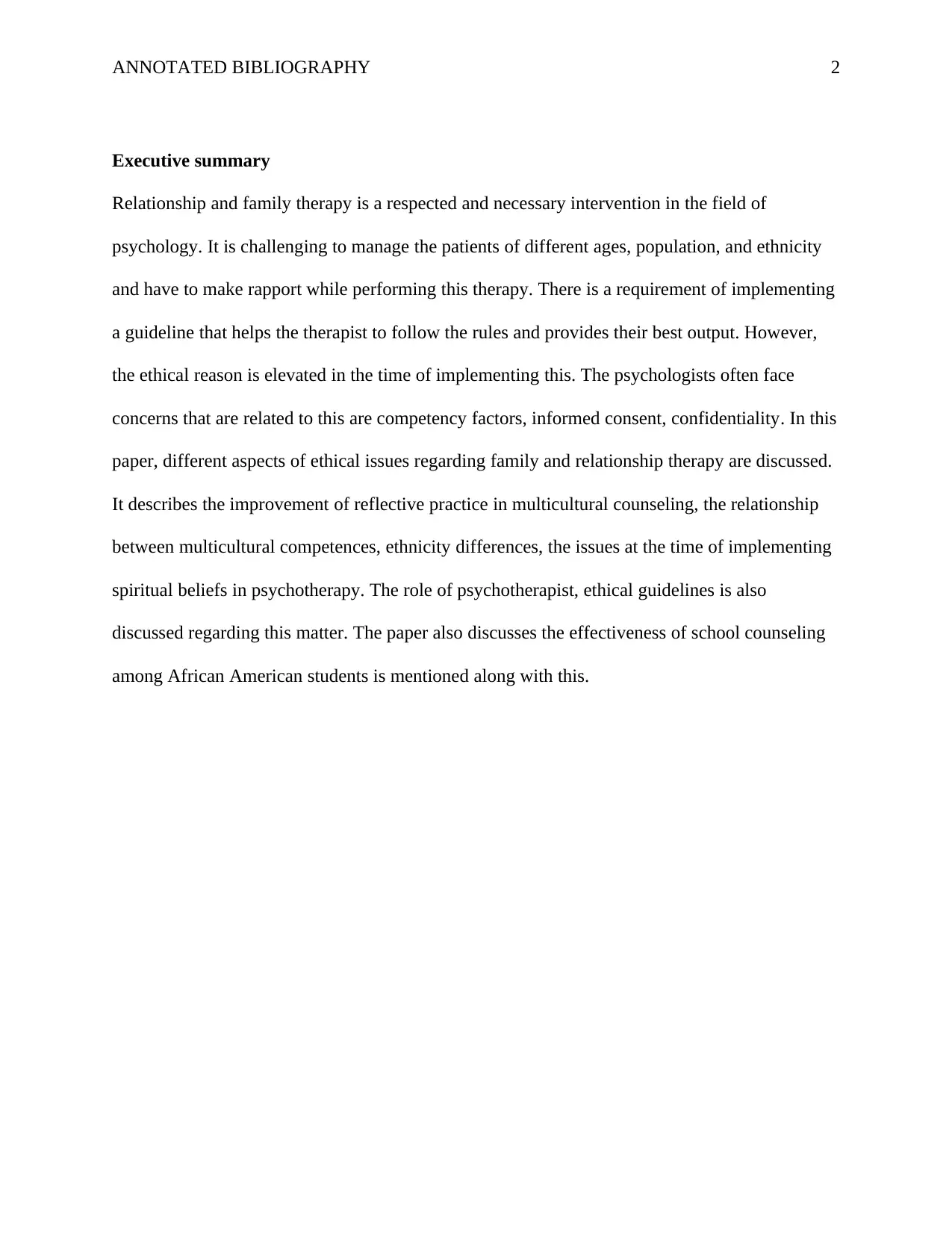
ANNOTATED BIBLIOGRAPHY 2
Executive summary
Relationship and family therapy is a respected and necessary intervention in the field of
psychology. It is challenging to manage the patients of different ages, population, and ethnicity
and have to make rapport while performing this therapy. There is a requirement of implementing
a guideline that helps the therapist to follow the rules and provides their best output. However,
the ethical reason is elevated in the time of implementing this. The psychologists often face
concerns that are related to this are competency factors, informed consent, confidentiality. In this
paper, different aspects of ethical issues regarding family and relationship therapy are discussed.
It describes the improvement of reflective practice in multicultural counseling, the relationship
between multicultural competences, ethnicity differences, the issues at the time of implementing
spiritual beliefs in psychotherapy. The role of psychotherapist, ethical guidelines is also
discussed regarding this matter. The paper also discusses the effectiveness of school counseling
among African American students is mentioned along with this.
Executive summary
Relationship and family therapy is a respected and necessary intervention in the field of
psychology. It is challenging to manage the patients of different ages, population, and ethnicity
and have to make rapport while performing this therapy. There is a requirement of implementing
a guideline that helps the therapist to follow the rules and provides their best output. However,
the ethical reason is elevated in the time of implementing this. The psychologists often face
concerns that are related to this are competency factors, informed consent, confidentiality. In this
paper, different aspects of ethical issues regarding family and relationship therapy are discussed.
It describes the improvement of reflective practice in multicultural counseling, the relationship
between multicultural competences, ethnicity differences, the issues at the time of implementing
spiritual beliefs in psychotherapy. The role of psychotherapist, ethical guidelines is also
discussed regarding this matter. The paper also discusses the effectiveness of school counseling
among African American students is mentioned along with this.
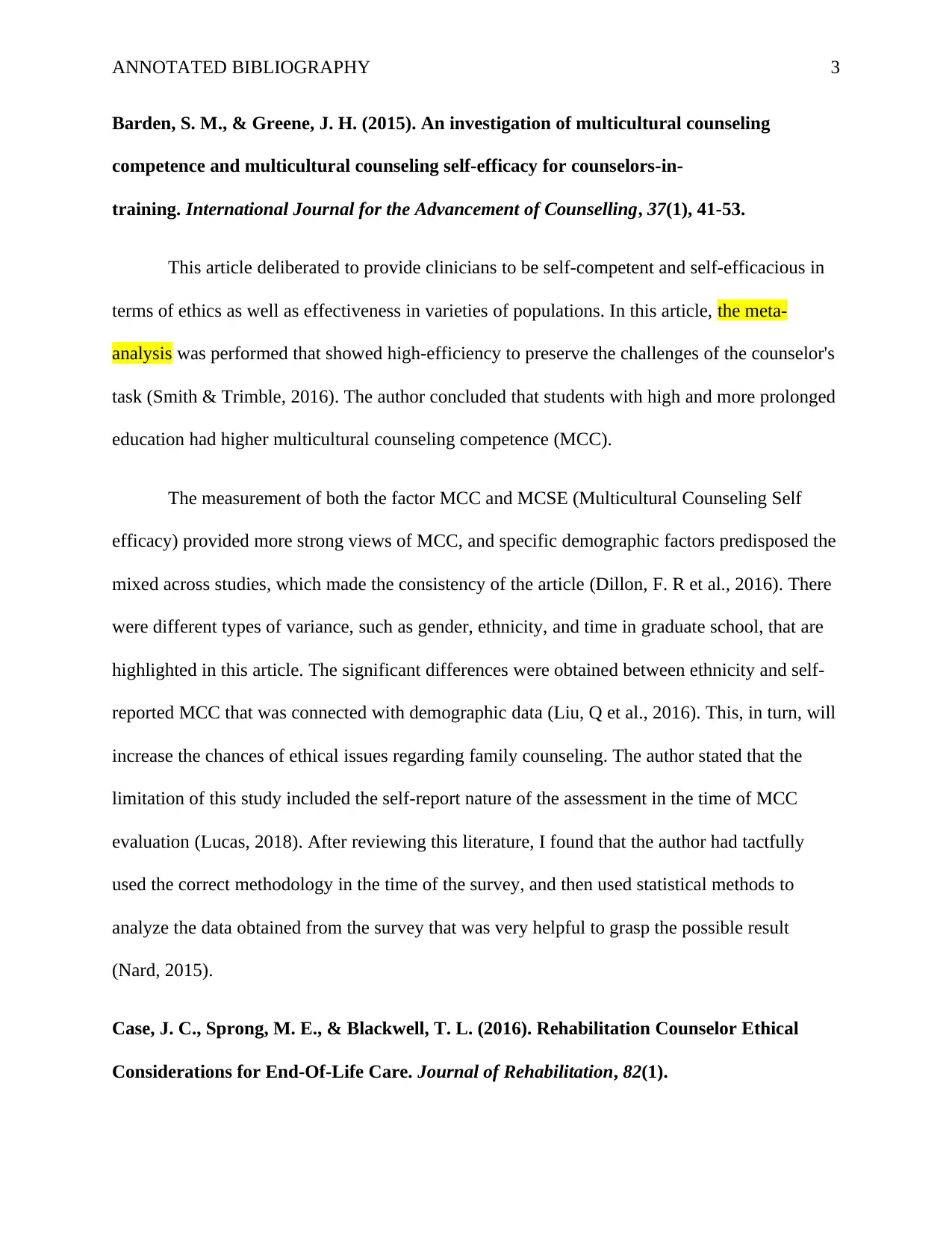
ANNOTATED BIBLIOGRAPHY 3
Barden, S. M., & Greene, J. H. (2015). An investigation of multicultural counseling
competence and multicultural counseling self-efficacy for counselors-in-
training. International Journal for the Advancement of Counselling, 37(1), 41-53.
This article deliberated to provide clinicians to be self-competent and self-efficacious in
terms of ethics as well as effectiveness in varieties of populations. In this article, the meta-
analysis was performed that showed high-efficiency to preserve the challenges of the counselor's
task (Smith & Trimble, 2016). The author concluded that students with high and more prolonged
education had higher multicultural counseling competence (MCC).
The measurement of both the factor MCC and MCSE (Multicultural Counseling Self
efficacy) provided more strong views of MCC, and specific demographic factors predisposed the
mixed across studies, which made the consistency of the article (Dillon, F. R et al., 2016). There
were different types of variance, such as gender, ethnicity, and time in graduate school, that are
highlighted in this article. The significant differences were obtained between ethnicity and self-
reported MCC that was connected with demographic data (Liu, Q et al., 2016). This, in turn, will
increase the chances of ethical issues regarding family counseling. The author stated that the
limitation of this study included the self-report nature of the assessment in the time of MCC
evaluation (Lucas, 2018). After reviewing this literature, I found that the author had tactfully
used the correct methodology in the time of the survey, and then used statistical methods to
analyze the data obtained from the survey that was very helpful to grasp the possible result
(Nard, 2015).
Case, J. C., Sprong, M. E., & Blackwell, T. L. (2016). Rehabilitation Counselor Ethical
Considerations for End-Of-Life Care. Journal of Rehabilitation, 82(1).
Barden, S. M., & Greene, J. H. (2015). An investigation of multicultural counseling
competence and multicultural counseling self-efficacy for counselors-in-
training. International Journal for the Advancement of Counselling, 37(1), 41-53.
This article deliberated to provide clinicians to be self-competent and self-efficacious in
terms of ethics as well as effectiveness in varieties of populations. In this article, the meta-
analysis was performed that showed high-efficiency to preserve the challenges of the counselor's
task (Smith & Trimble, 2016). The author concluded that students with high and more prolonged
education had higher multicultural counseling competence (MCC).
The measurement of both the factor MCC and MCSE (Multicultural Counseling Self
efficacy) provided more strong views of MCC, and specific demographic factors predisposed the
mixed across studies, which made the consistency of the article (Dillon, F. R et al., 2016). There
were different types of variance, such as gender, ethnicity, and time in graduate school, that are
highlighted in this article. The significant differences were obtained between ethnicity and self-
reported MCC that was connected with demographic data (Liu, Q et al., 2016). This, in turn, will
increase the chances of ethical issues regarding family counseling. The author stated that the
limitation of this study included the self-report nature of the assessment in the time of MCC
evaluation (Lucas, 2018). After reviewing this literature, I found that the author had tactfully
used the correct methodology in the time of the survey, and then used statistical methods to
analyze the data obtained from the survey that was very helpful to grasp the possible result
(Nard, 2015).
Case, J. C., Sprong, M. E., & Blackwell, T. L. (2016). Rehabilitation Counselor Ethical
Considerations for End-Of-Life Care. Journal of Rehabilitation, 82(1).
⊘ This is a preview!⊘
Do you want full access?
Subscribe today to unlock all pages.

Trusted by 1+ million students worldwide
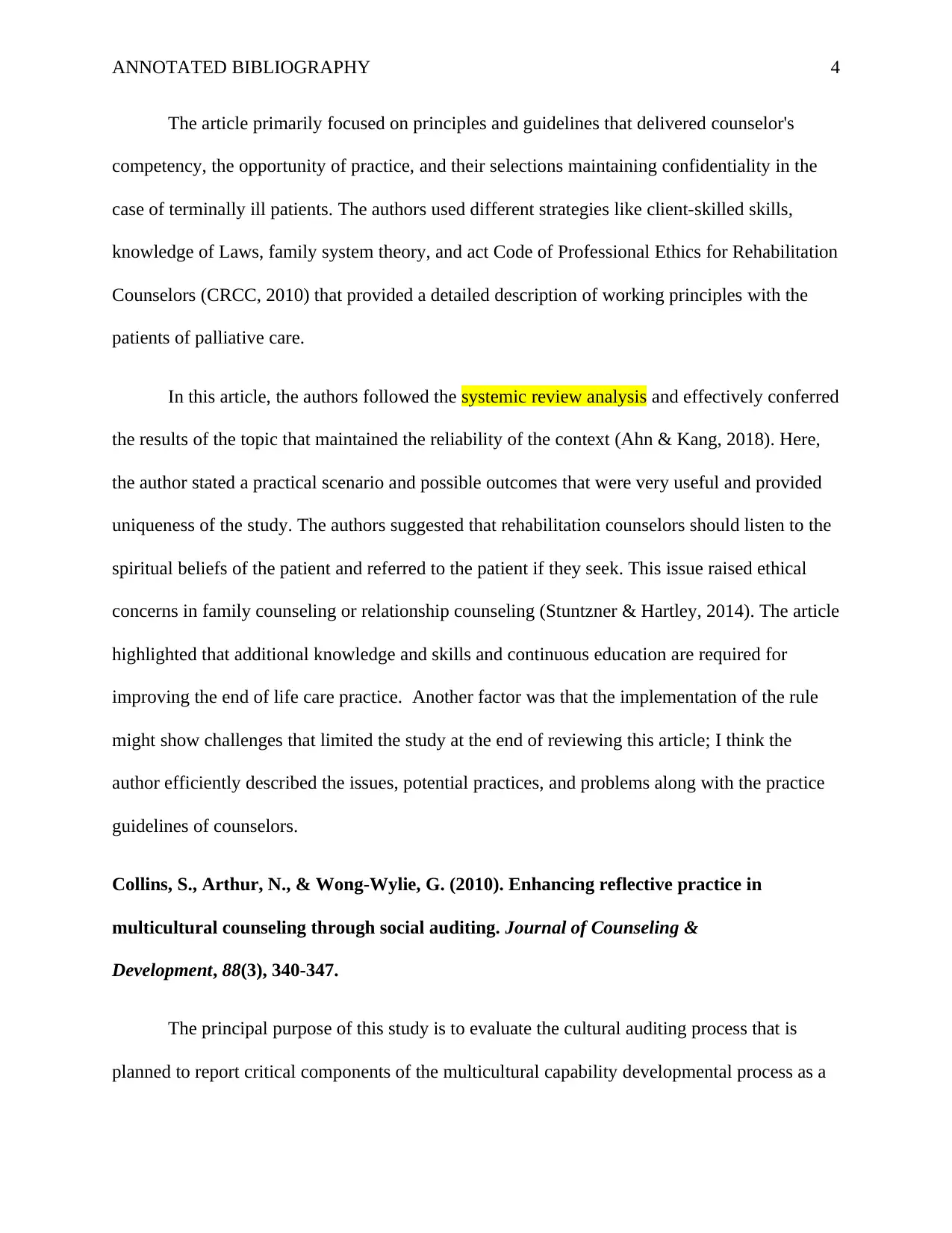
ANNOTATED BIBLIOGRAPHY 4
The article primarily focused on principles and guidelines that delivered counselor's
competency, the opportunity of practice, and their selections maintaining confidentiality in the
case of terminally ill patients. The authors used different strategies like client-skilled skills,
knowledge of Laws, family system theory, and act Code of Professional Ethics for Rehabilitation
Counselors (CRCC, 2010) that provided a detailed description of working principles with the
patients of palliative care.
In this article, the authors followed the systemic review analysis and effectively conferred
the results of the topic that maintained the reliability of the context (Ahn & Kang, 2018). Here,
the author stated a practical scenario and possible outcomes that were very useful and provided
uniqueness of the study. The authors suggested that rehabilitation counselors should listen to the
spiritual beliefs of the patient and referred to the patient if they seek. This issue raised ethical
concerns in family counseling or relationship counseling (Stuntzner & Hartley, 2014). The article
highlighted that additional knowledge and skills and continuous education are required for
improving the end of life care practice. Another factor was that the implementation of the rule
might show challenges that limited the study at the end of reviewing this article; I think the
author efficiently described the issues, potential practices, and problems along with the practice
guidelines of counselors.
Collins, S., Arthur, N., & Wong‐Wylie, G. (2010). Enhancing reflective practice in
multicultural counseling through social auditing. Journal of Counseling &
Development, 88(3), 340-347.
The principal purpose of this study is to evaluate the cultural auditing process that is
planned to report critical components of the multicultural capability developmental process as a
The article primarily focused on principles and guidelines that delivered counselor's
competency, the opportunity of practice, and their selections maintaining confidentiality in the
case of terminally ill patients. The authors used different strategies like client-skilled skills,
knowledge of Laws, family system theory, and act Code of Professional Ethics for Rehabilitation
Counselors (CRCC, 2010) that provided a detailed description of working principles with the
patients of palliative care.
In this article, the authors followed the systemic review analysis and effectively conferred
the results of the topic that maintained the reliability of the context (Ahn & Kang, 2018). Here,
the author stated a practical scenario and possible outcomes that were very useful and provided
uniqueness of the study. The authors suggested that rehabilitation counselors should listen to the
spiritual beliefs of the patient and referred to the patient if they seek. This issue raised ethical
concerns in family counseling or relationship counseling (Stuntzner & Hartley, 2014). The article
highlighted that additional knowledge and skills and continuous education are required for
improving the end of life care practice. Another factor was that the implementation of the rule
might show challenges that limited the study at the end of reviewing this article; I think the
author efficiently described the issues, potential practices, and problems along with the practice
guidelines of counselors.
Collins, S., Arthur, N., & Wong‐Wylie, G. (2010). Enhancing reflective practice in
multicultural counseling through social auditing. Journal of Counseling &
Development, 88(3), 340-347.
The principal purpose of this study is to evaluate the cultural auditing process that is
planned to report critical components of the multicultural capability developmental process as a
Paraphrase This Document
Need a fresh take? Get an instant paraphrase of this document with our AI Paraphraser
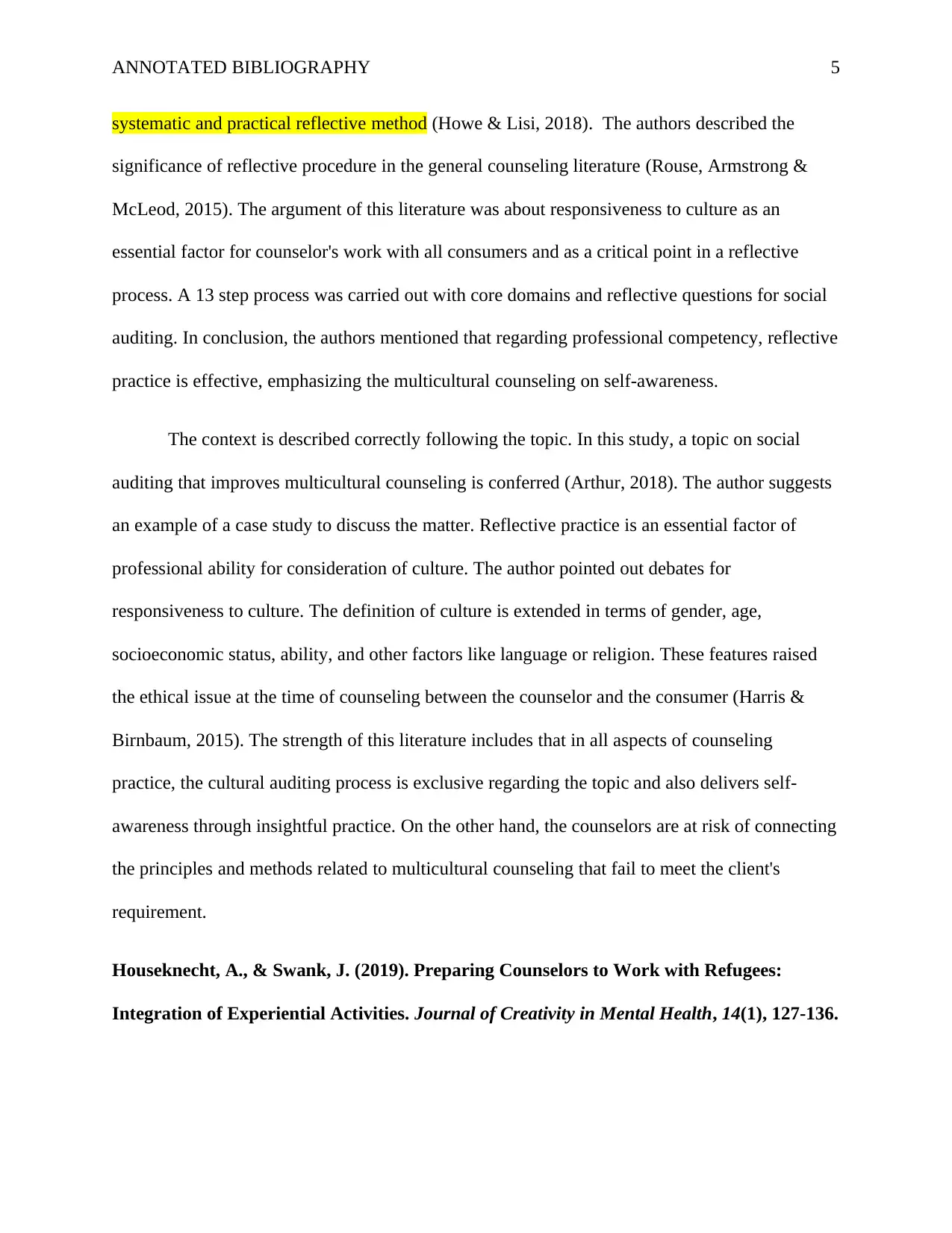
ANNOTATED BIBLIOGRAPHY 5
systematic and practical reflective method (Howe & Lisi, 2018). The authors described the
significance of reflective procedure in the general counseling literature (Rouse, Armstrong &
McLeod, 2015). The argument of this literature was about responsiveness to culture as an
essential factor for counselor's work with all consumers and as a critical point in a reflective
process. A 13 step process was carried out with core domains and reflective questions for social
auditing. In conclusion, the authors mentioned that regarding professional competency, reflective
practice is effective, emphasizing the multicultural counseling on self-awareness.
The context is described correctly following the topic. In this study, a topic on social
auditing that improves multicultural counseling is conferred (Arthur, 2018). The author suggests
an example of a case study to discuss the matter. Reflective practice is an essential factor of
professional ability for consideration of culture. The author pointed out debates for
responsiveness to culture. The definition of culture is extended in terms of gender, age,
socioeconomic status, ability, and other factors like language or religion. These features raised
the ethical issue at the time of counseling between the counselor and the consumer (Harris &
Birnbaum, 2015). The strength of this literature includes that in all aspects of counseling
practice, the cultural auditing process is exclusive regarding the topic and also delivers self-
awareness through insightful practice. On the other hand, the counselors are at risk of connecting
the principles and methods related to multicultural counseling that fail to meet the client's
requirement.
Houseknecht, A., & Swank, J. (2019). Preparing Counselors to Work with Refugees:
Integration of Experiential Activities. Journal of Creativity in Mental Health, 14(1), 127-136.
systematic and practical reflective method (Howe & Lisi, 2018). The authors described the
significance of reflective procedure in the general counseling literature (Rouse, Armstrong &
McLeod, 2015). The argument of this literature was about responsiveness to culture as an
essential factor for counselor's work with all consumers and as a critical point in a reflective
process. A 13 step process was carried out with core domains and reflective questions for social
auditing. In conclusion, the authors mentioned that regarding professional competency, reflective
practice is effective, emphasizing the multicultural counseling on self-awareness.
The context is described correctly following the topic. In this study, a topic on social
auditing that improves multicultural counseling is conferred (Arthur, 2018). The author suggests
an example of a case study to discuss the matter. Reflective practice is an essential factor of
professional ability for consideration of culture. The author pointed out debates for
responsiveness to culture. The definition of culture is extended in terms of gender, age,
socioeconomic status, ability, and other factors like language or religion. These features raised
the ethical issue at the time of counseling between the counselor and the consumer (Harris &
Birnbaum, 2015). The strength of this literature includes that in all aspects of counseling
practice, the cultural auditing process is exclusive regarding the topic and also delivers self-
awareness through insightful practice. On the other hand, the counselors are at risk of connecting
the principles and methods related to multicultural counseling that fail to meet the client's
requirement.
Houseknecht, A., & Swank, J. (2019). Preparing Counselors to Work with Refugees:
Integration of Experiential Activities. Journal of Creativity in Mental Health, 14(1), 127-136.
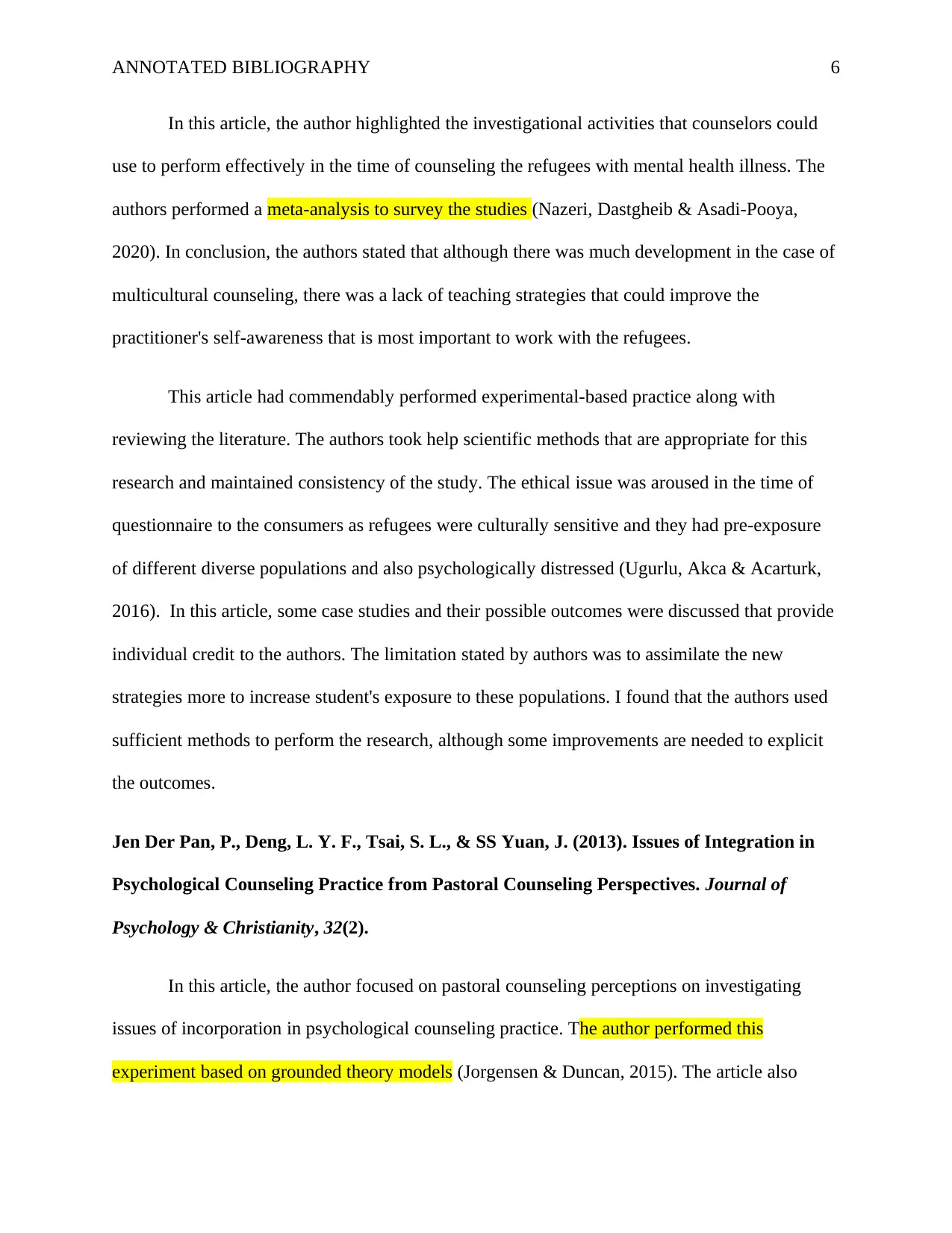
ANNOTATED BIBLIOGRAPHY 6
In this article, the author highlighted the investigational activities that counselors could
use to perform effectively in the time of counseling the refugees with mental health illness. The
authors performed a meta-analysis to survey the studies (Nazeri, Dastgheib & Asadi-Pooya,
2020). In conclusion, the authors stated that although there was much development in the case of
multicultural counseling, there was a lack of teaching strategies that could improve the
practitioner's self-awareness that is most important to work with the refugees.
This article had commendably performed experimental-based practice along with
reviewing the literature. The authors took help scientific methods that are appropriate for this
research and maintained consistency of the study. The ethical issue was aroused in the time of
questionnaire to the consumers as refugees were culturally sensitive and they had pre-exposure
of different diverse populations and also psychologically distressed (Ugurlu, Akca & Acarturk,
2016). In this article, some case studies and their possible outcomes were discussed that provide
individual credit to the authors. The limitation stated by authors was to assimilate the new
strategies more to increase student's exposure to these populations. I found that the authors used
sufficient methods to perform the research, although some improvements are needed to explicit
the outcomes.
Jen Der Pan, P., Deng, L. Y. F., Tsai, S. L., & SS Yuan, J. (2013). Issues of Integration in
Psychological Counseling Practice from Pastoral Counseling Perspectives. Journal of
Psychology & Christianity, 32(2).
In this article, the author focused on pastoral counseling perceptions on investigating
issues of incorporation in psychological counseling practice. The author performed this
experiment based on grounded theory models (Jorgensen & Duncan, 2015). The article also
In this article, the author highlighted the investigational activities that counselors could
use to perform effectively in the time of counseling the refugees with mental health illness. The
authors performed a meta-analysis to survey the studies (Nazeri, Dastgheib & Asadi-Pooya,
2020). In conclusion, the authors stated that although there was much development in the case of
multicultural counseling, there was a lack of teaching strategies that could improve the
practitioner's self-awareness that is most important to work with the refugees.
This article had commendably performed experimental-based practice along with
reviewing the literature. The authors took help scientific methods that are appropriate for this
research and maintained consistency of the study. The ethical issue was aroused in the time of
questionnaire to the consumers as refugees were culturally sensitive and they had pre-exposure
of different diverse populations and also psychologically distressed (Ugurlu, Akca & Acarturk,
2016). In this article, some case studies and their possible outcomes were discussed that provide
individual credit to the authors. The limitation stated by authors was to assimilate the new
strategies more to increase student's exposure to these populations. I found that the authors used
sufficient methods to perform the research, although some improvements are needed to explicit
the outcomes.
Jen Der Pan, P., Deng, L. Y. F., Tsai, S. L., & SS Yuan, J. (2013). Issues of Integration in
Psychological Counseling Practice from Pastoral Counseling Perspectives. Journal of
Psychology & Christianity, 32(2).
In this article, the author focused on pastoral counseling perceptions on investigating
issues of incorporation in psychological counseling practice. The author performed this
experiment based on grounded theory models (Jorgensen & Duncan, 2015). The article also
⊘ This is a preview!⊘
Do you want full access?
Subscribe today to unlock all pages.

Trusted by 1+ million students worldwide
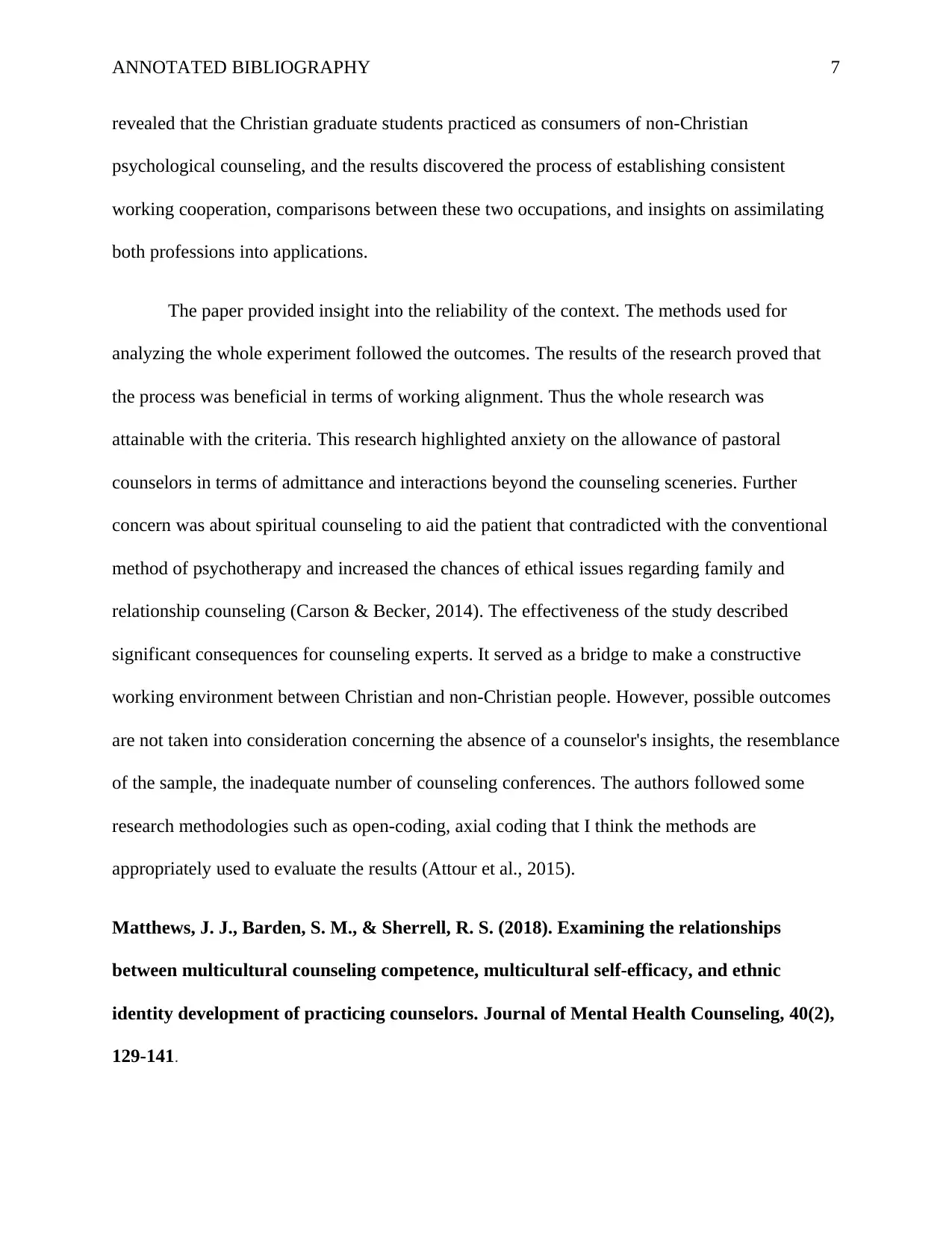
ANNOTATED BIBLIOGRAPHY 7
revealed that the Christian graduate students practiced as consumers of non-Christian
psychological counseling, and the results discovered the process of establishing consistent
working cooperation, comparisons between these two occupations, and insights on assimilating
both professions into applications.
The paper provided insight into the reliability of the context. The methods used for
analyzing the whole experiment followed the outcomes. The results of the research proved that
the process was beneficial in terms of working alignment. Thus the whole research was
attainable with the criteria. This research highlighted anxiety on the allowance of pastoral
counselors in terms of admittance and interactions beyond the counseling sceneries. Further
concern was about spiritual counseling to aid the patient that contradicted with the conventional
method of psychotherapy and increased the chances of ethical issues regarding family and
relationship counseling (Carson & Becker, 2014). The effectiveness of the study described
significant consequences for counseling experts. It served as a bridge to make a constructive
working environment between Christian and non-Christian people. However, possible outcomes
are not taken into consideration concerning the absence of a counselor's insights, the resemblance
of the sample, the inadequate number of counseling conferences. The authors followed some
research methodologies such as open-coding, axial coding that I think the methods are
appropriately used to evaluate the results (Attour et al., 2015).
Matthews, J. J., Barden, S. M., & Sherrell, R. S. (2018). Examining the relationships
between multicultural counseling competence, multicultural self-efficacy, and ethnic
identity development of practicing counselors. Journal of Mental Health Counseling, 40(2),
129-141.
revealed that the Christian graduate students practiced as consumers of non-Christian
psychological counseling, and the results discovered the process of establishing consistent
working cooperation, comparisons between these two occupations, and insights on assimilating
both professions into applications.
The paper provided insight into the reliability of the context. The methods used for
analyzing the whole experiment followed the outcomes. The results of the research proved that
the process was beneficial in terms of working alignment. Thus the whole research was
attainable with the criteria. This research highlighted anxiety on the allowance of pastoral
counselors in terms of admittance and interactions beyond the counseling sceneries. Further
concern was about spiritual counseling to aid the patient that contradicted with the conventional
method of psychotherapy and increased the chances of ethical issues regarding family and
relationship counseling (Carson & Becker, 2014). The effectiveness of the study described
significant consequences for counseling experts. It served as a bridge to make a constructive
working environment between Christian and non-Christian people. However, possible outcomes
are not taken into consideration concerning the absence of a counselor's insights, the resemblance
of the sample, the inadequate number of counseling conferences. The authors followed some
research methodologies such as open-coding, axial coding that I think the methods are
appropriately used to evaluate the results (Attour et al., 2015).
Matthews, J. J., Barden, S. M., & Sherrell, R. S. (2018). Examining the relationships
between multicultural counseling competence, multicultural self-efficacy, and ethnic
identity development of practicing counselors. Journal of Mental Health Counseling, 40(2),
129-141.
Paraphrase This Document
Need a fresh take? Get an instant paraphrase of this document with our AI Paraphraser
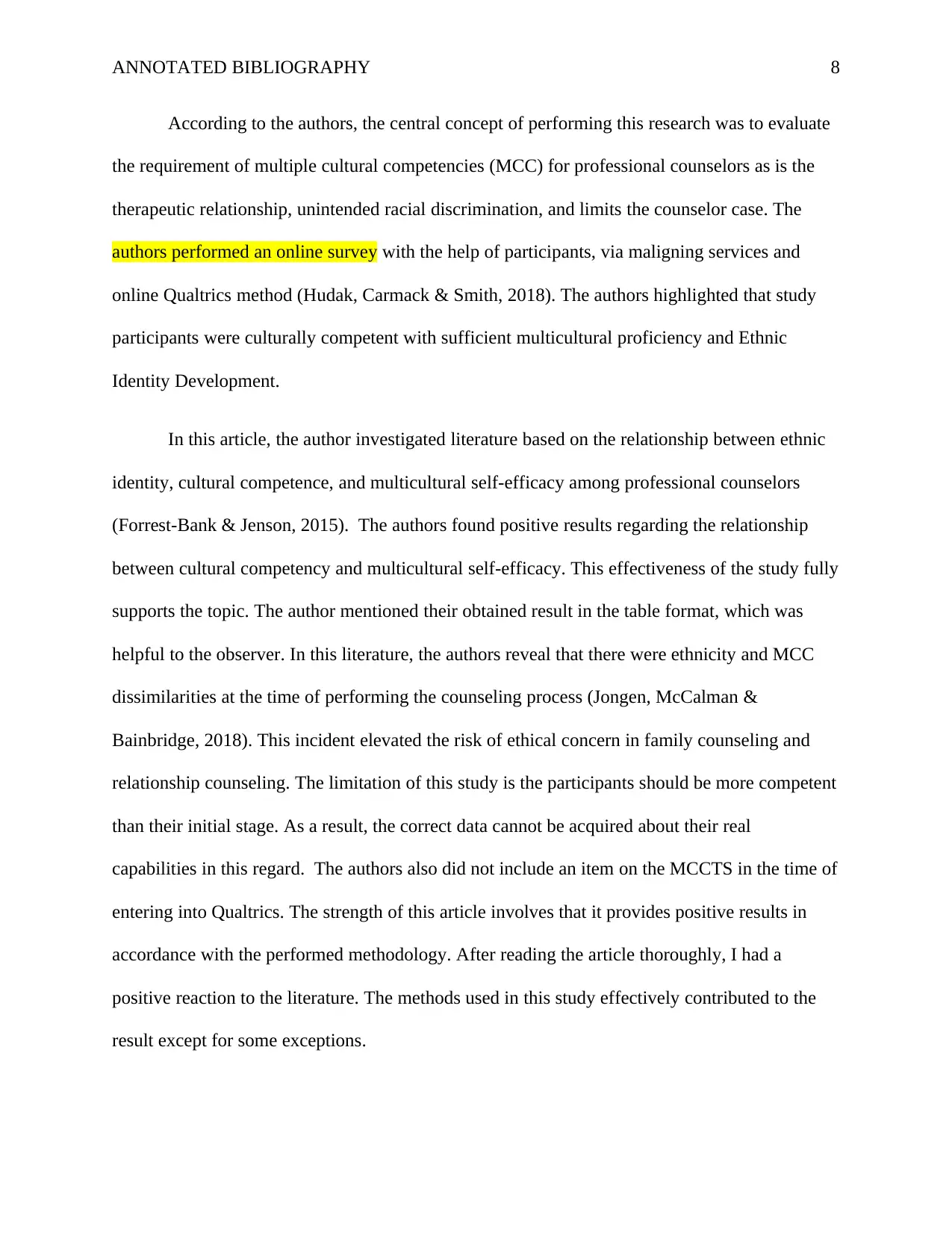
ANNOTATED BIBLIOGRAPHY 8
According to the authors, the central concept of performing this research was to evaluate
the requirement of multiple cultural competencies (MCC) for professional counselors as is the
therapeutic relationship, unintended racial discrimination, and limits the counselor case. The
authors performed an online survey with the help of participants, via maligning services and
online Qualtrics method (Hudak, Carmack & Smith, 2018). The authors highlighted that study
participants were culturally competent with sufficient multicultural proficiency and Ethnic
Identity Development.
In this article, the author investigated literature based on the relationship between ethnic
identity, cultural competence, and multicultural self-efficacy among professional counselors
(Forrest-Bank & Jenson, 2015). The authors found positive results regarding the relationship
between cultural competency and multicultural self-efficacy. This effectiveness of the study fully
supports the topic. The author mentioned their obtained result in the table format, which was
helpful to the observer. In this literature, the authors reveal that there were ethnicity and MCC
dissimilarities at the time of performing the counseling process (Jongen, McCalman &
Bainbridge, 2018). This incident elevated the risk of ethical concern in family counseling and
relationship counseling. The limitation of this study is the participants should be more competent
than their initial stage. As a result, the correct data cannot be acquired about their real
capabilities in this regard. The authors also did not include an item on the MCCTS in the time of
entering into Qualtrics. The strength of this article involves that it provides positive results in
accordance with the performed methodology. After reading the article thoroughly, I had a
positive reaction to the literature. The methods used in this study effectively contributed to the
result except for some exceptions.
According to the authors, the central concept of performing this research was to evaluate
the requirement of multiple cultural competencies (MCC) for professional counselors as is the
therapeutic relationship, unintended racial discrimination, and limits the counselor case. The
authors performed an online survey with the help of participants, via maligning services and
online Qualtrics method (Hudak, Carmack & Smith, 2018). The authors highlighted that study
participants were culturally competent with sufficient multicultural proficiency and Ethnic
Identity Development.
In this article, the author investigated literature based on the relationship between ethnic
identity, cultural competence, and multicultural self-efficacy among professional counselors
(Forrest-Bank & Jenson, 2015). The authors found positive results regarding the relationship
between cultural competency and multicultural self-efficacy. This effectiveness of the study fully
supports the topic. The author mentioned their obtained result in the table format, which was
helpful to the observer. In this literature, the authors reveal that there were ethnicity and MCC
dissimilarities at the time of performing the counseling process (Jongen, McCalman &
Bainbridge, 2018). This incident elevated the risk of ethical concern in family counseling and
relationship counseling. The limitation of this study is the participants should be more competent
than their initial stage. As a result, the correct data cannot be acquired about their real
capabilities in this regard. The authors also did not include an item on the MCCTS in the time of
entering into Qualtrics. The strength of this article involves that it provides positive results in
accordance with the performed methodology. After reading the article thoroughly, I had a
positive reaction to the literature. The methods used in this study effectively contributed to the
result except for some exceptions.
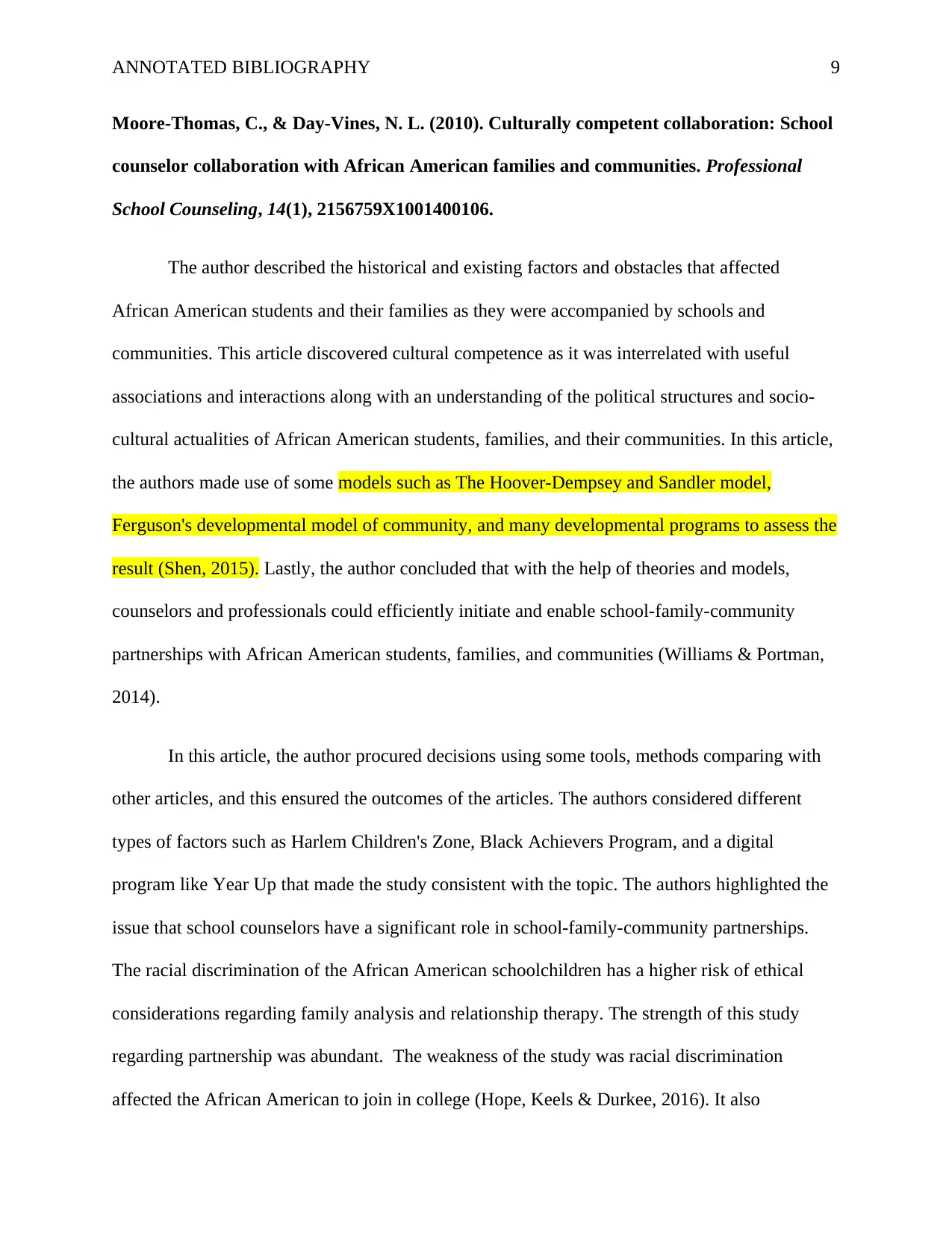
ANNOTATED BIBLIOGRAPHY 9
Moore-Thomas, C., & Day-Vines, N. L. (2010). Culturally competent collaboration: School
counselor collaboration with African American families and communities. Professional
School Counseling, 14(1), 2156759X1001400106.
The author described the historical and existing factors and obstacles that affected
African American students and their families as they were accompanied by schools and
communities. This article discovered cultural competence as it was interrelated with useful
associations and interactions along with an understanding of the political structures and socio-
cultural actualities of African American students, families, and their communities. In this article,
the authors made use of some models such as The Hoover-Dempsey and Sandler model,
Ferguson's developmental model of community, and many developmental programs to assess the
result (Shen, 2015). Lastly, the author concluded that with the help of theories and models,
counselors and professionals could efficiently initiate and enable school-family-community
partnerships with African American students, families, and communities (Williams & Portman,
2014).
In this article, the author procured decisions using some tools, methods comparing with
other articles, and this ensured the outcomes of the articles. The authors considered different
types of factors such as Harlem Children's Zone, Black Achievers Program, and a digital
program like Year Up that made the study consistent with the topic. The authors highlighted the
issue that school counselors have a significant role in school-family-community partnerships.
The racial discrimination of the African American schoolchildren has a higher risk of ethical
considerations regarding family analysis and relationship therapy. The strength of this study
regarding partnership was abundant. The weakness of the study was racial discrimination
affected the African American to join in college (Hope, Keels & Durkee, 2016). It also
Moore-Thomas, C., & Day-Vines, N. L. (2010). Culturally competent collaboration: School
counselor collaboration with African American families and communities. Professional
School Counseling, 14(1), 2156759X1001400106.
The author described the historical and existing factors and obstacles that affected
African American students and their families as they were accompanied by schools and
communities. This article discovered cultural competence as it was interrelated with useful
associations and interactions along with an understanding of the political structures and socio-
cultural actualities of African American students, families, and their communities. In this article,
the authors made use of some models such as The Hoover-Dempsey and Sandler model,
Ferguson's developmental model of community, and many developmental programs to assess the
result (Shen, 2015). Lastly, the author concluded that with the help of theories and models,
counselors and professionals could efficiently initiate and enable school-family-community
partnerships with African American students, families, and communities (Williams & Portman,
2014).
In this article, the author procured decisions using some tools, methods comparing with
other articles, and this ensured the outcomes of the articles. The authors considered different
types of factors such as Harlem Children's Zone, Black Achievers Program, and a digital
program like Year Up that made the study consistent with the topic. The authors highlighted the
issue that school counselors have a significant role in school-family-community partnerships.
The racial discrimination of the African American schoolchildren has a higher risk of ethical
considerations regarding family analysis and relationship therapy. The strength of this study
regarding partnership was abundant. The weakness of the study was racial discrimination
affected the African American to join in college (Hope, Keels & Durkee, 2016). It also
⊘ This is a preview!⊘
Do you want full access?
Subscribe today to unlock all pages.

Trusted by 1+ million students worldwide
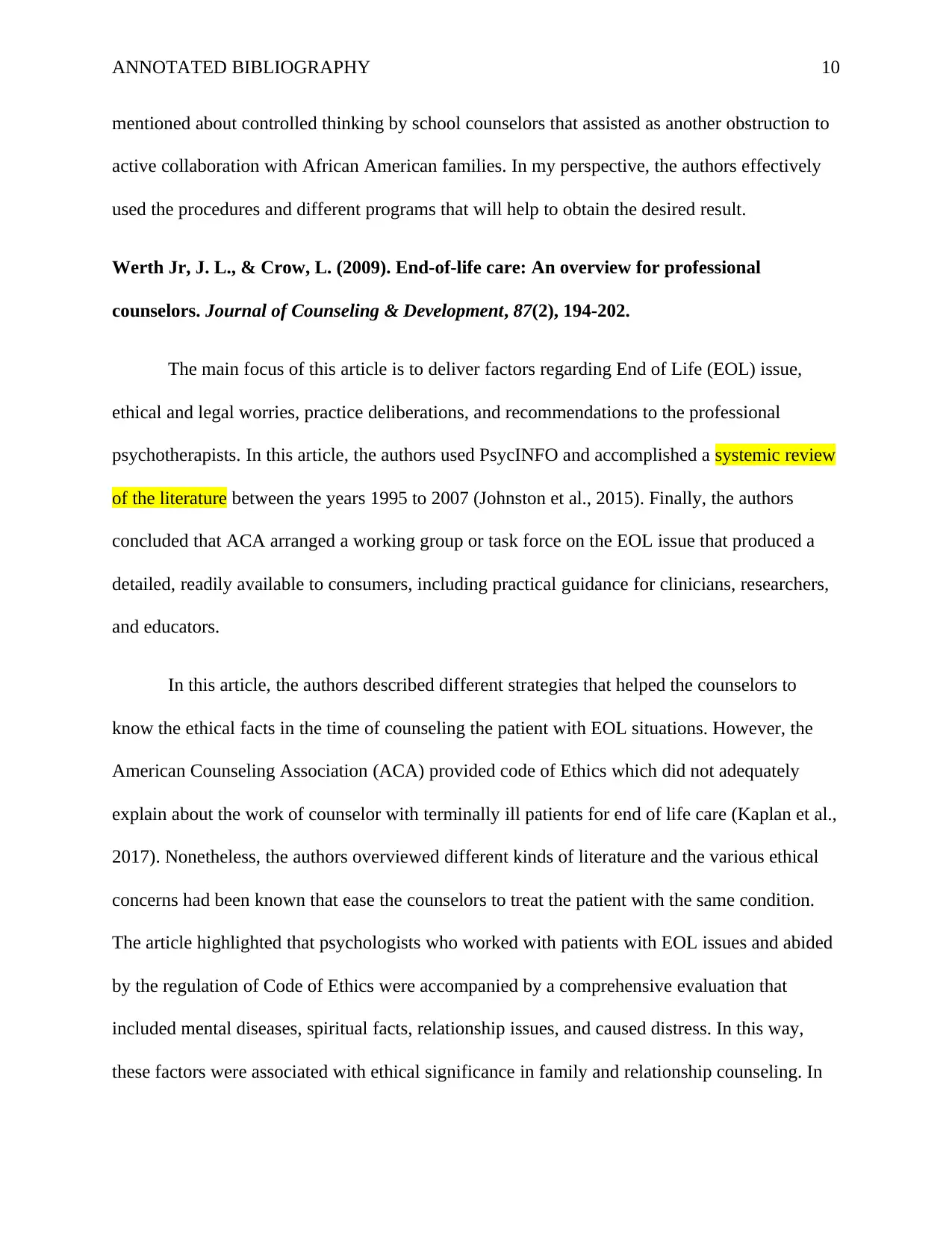
ANNOTATED BIBLIOGRAPHY 10
mentioned about controlled thinking by school counselors that assisted as another obstruction to
active collaboration with African American families. In my perspective, the authors effectively
used the procedures and different programs that will help to obtain the desired result.
Werth Jr, J. L., & Crow, L. (2009). End‐of‐life care: An overview for professional
counselors. Journal of Counseling & Development, 87(2), 194-202.
The main focus of this article is to deliver factors regarding End of Life (EOL) issue,
ethical and legal worries, practice deliberations, and recommendations to the professional
psychotherapists. In this article, the authors used PsycINFO and accomplished a systemic review
of the literature between the years 1995 to 2007 (Johnston et al., 2015). Finally, the authors
concluded that ACA arranged a working group or task force on the EOL issue that produced a
detailed, readily available to consumers, including practical guidance for clinicians, researchers,
and educators.
In this article, the authors described different strategies that helped the counselors to
know the ethical facts in the time of counseling the patient with EOL situations. However, the
American Counseling Association (ACA) provided code of Ethics which did not adequately
explain about the work of counselor with terminally ill patients for end of life care (Kaplan et al.,
2017). Nonetheless, the authors overviewed different kinds of literature and the various ethical
concerns had been known that ease the counselors to treat the patient with the same condition.
The article highlighted that psychologists who worked with patients with EOL issues and abided
by the regulation of Code of Ethics were accompanied by a comprehensive evaluation that
included mental diseases, spiritual facts, relationship issues, and caused distress. In this way,
these factors were associated with ethical significance in family and relationship counseling. In
mentioned about controlled thinking by school counselors that assisted as another obstruction to
active collaboration with African American families. In my perspective, the authors effectively
used the procedures and different programs that will help to obtain the desired result.
Werth Jr, J. L., & Crow, L. (2009). End‐of‐life care: An overview for professional
counselors. Journal of Counseling & Development, 87(2), 194-202.
The main focus of this article is to deliver factors regarding End of Life (EOL) issue,
ethical and legal worries, practice deliberations, and recommendations to the professional
psychotherapists. In this article, the authors used PsycINFO and accomplished a systemic review
of the literature between the years 1995 to 2007 (Johnston et al., 2015). Finally, the authors
concluded that ACA arranged a working group or task force on the EOL issue that produced a
detailed, readily available to consumers, including practical guidance for clinicians, researchers,
and educators.
In this article, the authors described different strategies that helped the counselors to
know the ethical facts in the time of counseling the patient with EOL situations. However, the
American Counseling Association (ACA) provided code of Ethics which did not adequately
explain about the work of counselor with terminally ill patients for end of life care (Kaplan et al.,
2017). Nonetheless, the authors overviewed different kinds of literature and the various ethical
concerns had been known that ease the counselors to treat the patient with the same condition.
The article highlighted that psychologists who worked with patients with EOL issues and abided
by the regulation of Code of Ethics were accompanied by a comprehensive evaluation that
included mental diseases, spiritual facts, relationship issues, and caused distress. In this way,
these factors were associated with ethical significance in family and relationship counseling. In
Paraphrase This Document
Need a fresh take? Get an instant paraphrase of this document with our AI Paraphraser
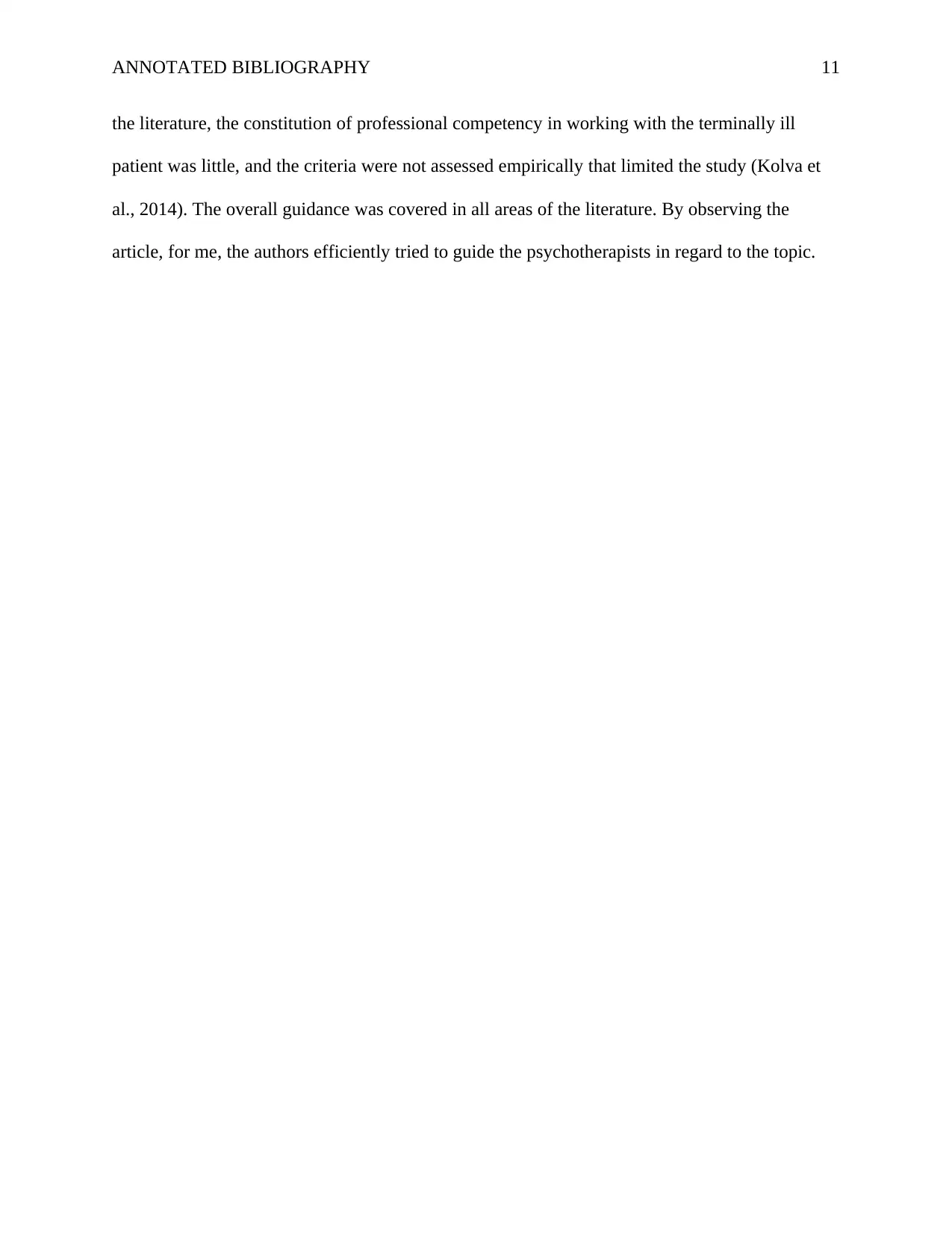
ANNOTATED BIBLIOGRAPHY 11
the literature, the constitution of professional competency in working with the terminally ill
patient was little, and the criteria were not assessed empirically that limited the study (Kolva et
al., 2014). The overall guidance was covered in all areas of the literature. By observing the
article, for me, the authors efficiently tried to guide the psychotherapists in regard to the topic.
the literature, the constitution of professional competency in working with the terminally ill
patient was little, and the criteria were not assessed empirically that limited the study (Kolva et
al., 2014). The overall guidance was covered in all areas of the literature. By observing the
article, for me, the authors efficiently tried to guide the psychotherapists in regard to the topic.
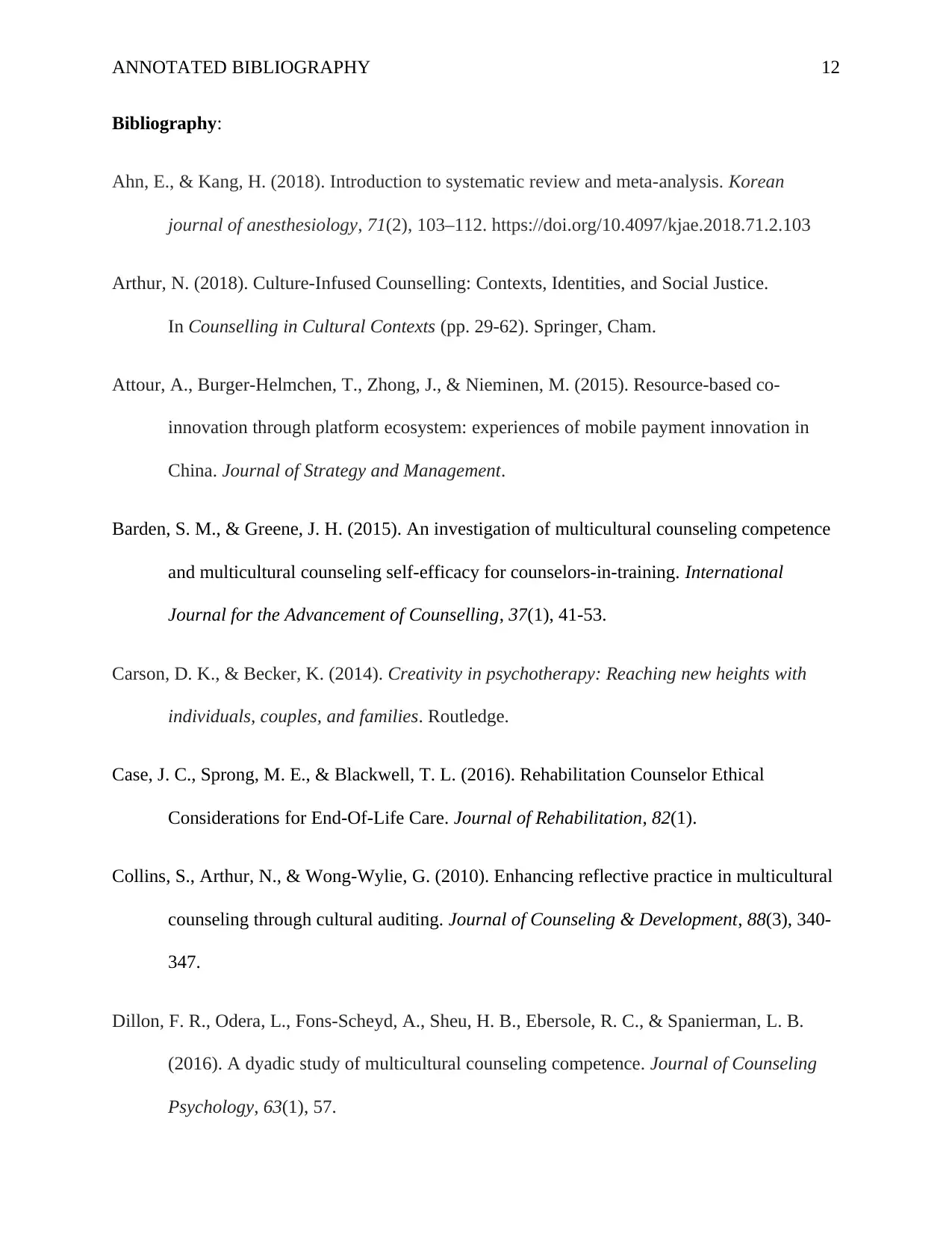
ANNOTATED BIBLIOGRAPHY 12
Bibliography:
Ahn, E., & Kang, H. (2018). Introduction to systematic review and meta-analysis. Korean
journal of anesthesiology, 71(2), 103–112. https://doi.org/10.4097/kjae.2018.71.2.103
Arthur, N. (2018). Culture-Infused Counselling: Contexts, Identities, and Social Justice.
In Counselling in Cultural Contexts (pp. 29-62). Springer, Cham.
Attour, A., Burger-Helmchen, T., Zhong, J., & Nieminen, M. (2015). Resource-based co-
innovation through platform ecosystem: experiences of mobile payment innovation in
China. Journal of Strategy and Management.
Barden, S. M., & Greene, J. H. (2015). An investigation of multicultural counseling competence
and multicultural counseling self-efficacy for counselors-in-training. International
Journal for the Advancement of Counselling, 37(1), 41-53.
Carson, D. K., & Becker, K. (2014). Creativity in psychotherapy: Reaching new heights with
individuals, couples, and families. Routledge.
Case, J. C., Sprong, M. E., & Blackwell, T. L. (2016). Rehabilitation Counselor Ethical
Considerations for End-Of-Life Care. Journal of Rehabilitation, 82(1).
Collins, S., Arthur, N., & Wong‐Wylie, G. (2010). Enhancing reflective practice in multicultural
counseling through cultural auditing. Journal of Counseling & Development, 88(3), 340-
347.
Dillon, F. R., Odera, L., Fons-Scheyd, A., Sheu, H. B., Ebersole, R. C., & Spanierman, L. B.
(2016). A dyadic study of multicultural counseling competence. Journal of Counseling
Psychology, 63(1), 57.
Bibliography:
Ahn, E., & Kang, H. (2018). Introduction to systematic review and meta-analysis. Korean
journal of anesthesiology, 71(2), 103–112. https://doi.org/10.4097/kjae.2018.71.2.103
Arthur, N. (2018). Culture-Infused Counselling: Contexts, Identities, and Social Justice.
In Counselling in Cultural Contexts (pp. 29-62). Springer, Cham.
Attour, A., Burger-Helmchen, T., Zhong, J., & Nieminen, M. (2015). Resource-based co-
innovation through platform ecosystem: experiences of mobile payment innovation in
China. Journal of Strategy and Management.
Barden, S. M., & Greene, J. H. (2015). An investigation of multicultural counseling competence
and multicultural counseling self-efficacy for counselors-in-training. International
Journal for the Advancement of Counselling, 37(1), 41-53.
Carson, D. K., & Becker, K. (2014). Creativity in psychotherapy: Reaching new heights with
individuals, couples, and families. Routledge.
Case, J. C., Sprong, M. E., & Blackwell, T. L. (2016). Rehabilitation Counselor Ethical
Considerations for End-Of-Life Care. Journal of Rehabilitation, 82(1).
Collins, S., Arthur, N., & Wong‐Wylie, G. (2010). Enhancing reflective practice in multicultural
counseling through cultural auditing. Journal of Counseling & Development, 88(3), 340-
347.
Dillon, F. R., Odera, L., Fons-Scheyd, A., Sheu, H. B., Ebersole, R. C., & Spanierman, L. B.
(2016). A dyadic study of multicultural counseling competence. Journal of Counseling
Psychology, 63(1), 57.
⊘ This is a preview!⊘
Do you want full access?
Subscribe today to unlock all pages.

Trusted by 1+ million students worldwide
1 out of 16
Your All-in-One AI-Powered Toolkit for Academic Success.
+13062052269
info@desklib.com
Available 24*7 on WhatsApp / Email
![[object Object]](/_next/static/media/star-bottom.7253800d.svg)
Unlock your academic potential
Copyright © 2020–2026 A2Z Services. All Rights Reserved. Developed and managed by ZUCOL.

